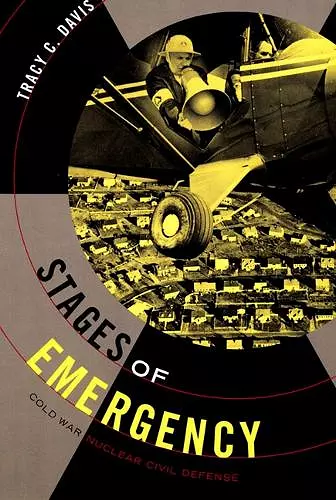Stages of Emergency
Cold War Nuclear Civil Defense
Format:Hardback
Publisher:Duke University Press
Published:27th Jun '07
Currently unavailable, and unfortunately no date known when it will be back

Cultural history of the nuclear civil defence exercises in the US, Canada, and the UK, which emphasizes the performative aspect of the staged drills and evacuations
In an era defined by the threat of nuclear annihilation, Western nations attempted to prepare civilian populations for atomic attack through staged drills, evacuations, and field exercises. This book investigates the fundamentally theatrical nature of these Cold War civil defense exercises.In an era defined by the threat of nuclear annihilation, Western nations attempted to prepare civilian populations for atomic attack through staged drills, evacuations, and field exercises. In Stages of Emergency the distinguished performance historian Tracy C. Davis investigates the fundamentally theatrical nature of these Cold War civil defense exercises. Asking what it meant for civilians to be rehearsing nuclear war, she provides a comparative study of the civil defense maneuvers conducted by three NATO allies—the United States, Canada, and the United Kingdom—during the 1950s and 1960s. Delving deep into the three countries’ archives, she analyzes public exercises involving private citizens—Boy Scouts serving as mock casualties, housewives arranging home protection, clergy training to be shelter managers—as well as covert exercises undertaken by civil servants.
Stages of Emergency covers public education campaigns and school programs—such as the ubiquitous “duck and cover” drills—meant to heighten awareness of the dangers of a possible attack, the occupancy tests in which people stayed sequestered for up to two weeks to simulate post-attack living conditions as well as the effects of confinement on interpersonal dynamics, and the British first-aid training in which participants acted out psychological and physical trauma requiring immediate treatment. Davis also brings to light unpublicized government exercises aimed at anticipating the global effects of nuclear war. Her comparative analysis shows how the differing priorities, contingencies, and social policies of the three countries influenced their rehearsals of nuclear catastrophe. When the Cold War ended, so did these exercises, but, as Davis points out in her perceptive afterword, they have been revived—with strikingly similar recommendations—in response to twenty-first-century fears of terrorists, dirty bombs, and rogue states.
“Tracy C. Davis is a leading performance historian, and in Stages of Emergency she applies her considerable skills to a kind of ‘play’ that permeated the consciousness and determined much social reality in the United States, Canada, and the United Kingdom during the Cold War. The story she tells, and her analysis of it, goes to the very heart of what these societies were and are.”—Richard Schechner, author of Performance Studies: An Introduction
“Tracy C. Davis’s highly original cross-cultural study represents the most perceptive analysis of Cold War–era civil-defense theory and practice written to date. As a theater scholar, she focuses on the ‘rehearsal’ and performative aspects of civil-defense planning in a way that is brilliantly illuminating.”—Paul Boyer, author of By the Bomb’s Early Light: American Thought and Culture at the Dawn of the Atomic Age
“[An] inspired reading of the cold war. . . . The historical reach of Davis’s study, from the defense planning f the early 1950s and 1960s to the dissolution of the Soviet Union in 1991, is as impressive as her ability to move with subtlety between civil defense in the United States and that in Canada or Britain.” -- Martin Halliwell * Theatre Survey *
“Davis presents meticulous discussions throughout the book, with extremely well-endnoted references, helping her to paint clear and in-depth pictures of these various exercises. These stories are surprisingly amusing to read, despite the seriousness of their underlying logic.” -- Joshua Abrams * TDR: The Drama Review *
ISBN: 9780822339595
Dimensions: unknown
Weight: 771g
432 pages